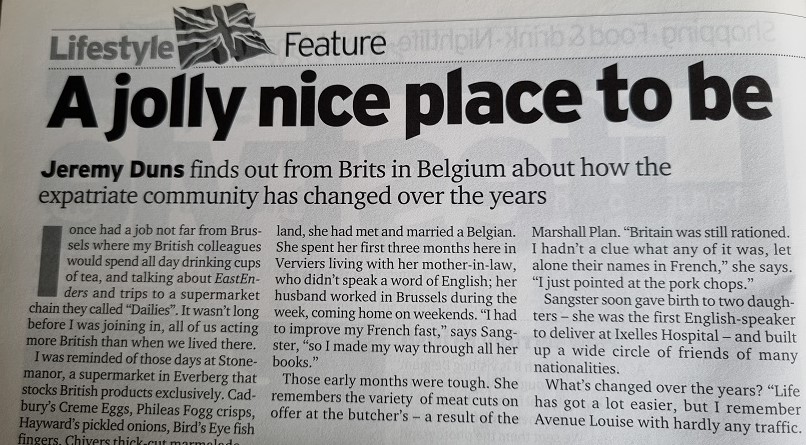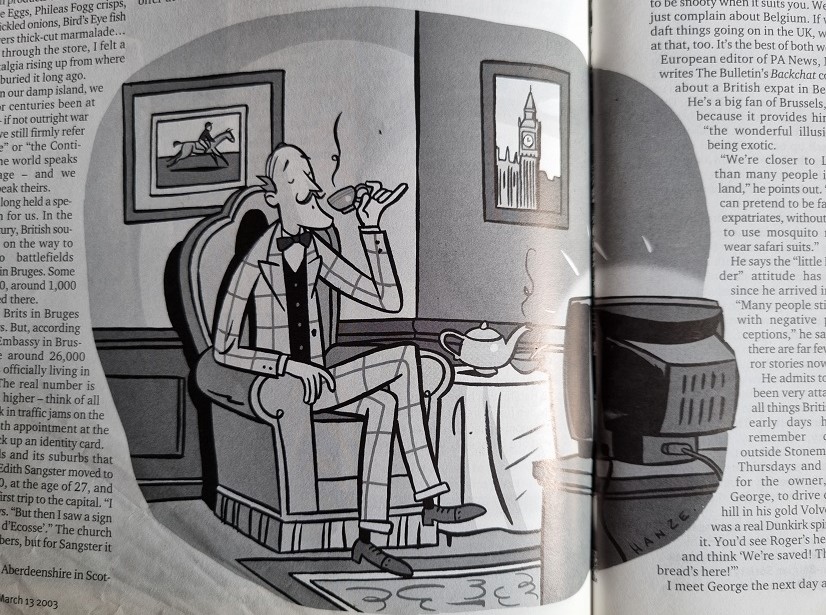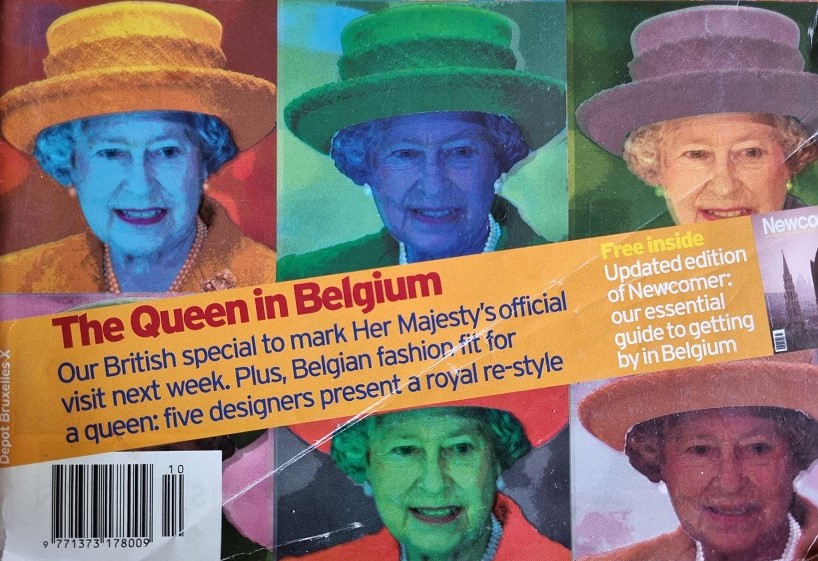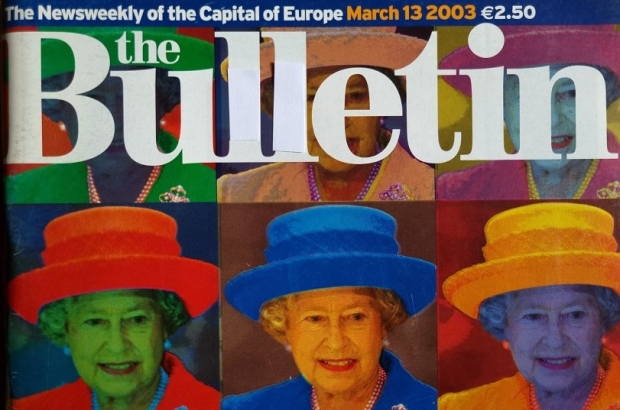- Daily & Weekly newsletters
- Buy & download The Bulletin
- Comment on our articles
From the archives (March 2003): The Bulletin talks to Brits in Belgium ahead of planned visit by the Queen
A Jolly Nice Place to Be: Jeremy Duns finds out from Brits in Belgium about how the expatriate community has changed over the years
I once had a job not far from Brussels where my British colleagues would spend all day drinking cups of tea, and talking about Eastenders and trips to a supermarket they called “Dailies”. It wasn’t long before I was joining in, all of us acting more British than when we lived there.
I was reminded of those days at Stonemanor, a supermarket in Everberg that stocks British products exclusively. Cadbury’s Creme Eggs, Phileas Fogg crisps, Hayward’s pickled onions, Bird’s Eye fish fingers, Chivers thick-cut marmalade… As I ambled through the store, I felt a peculiar nostalgia rising up from where I thought I’d buried it long ago.
Stuck out on our damp island, we Brits have for centuries been at loggerheads – if not outright war – with what we still firmly refer to as “Europe” or the “Continent”. Half the world speaks “our” language – and we hardly ever speak theirs.
Belgium has long held a special attraction for us. In the early 19th century, British souvenir-hunters on the way to the Waterloo battlefields would stop off in Bruges. Some stayed: by 1860, around 1,000 Brits had settled there.
Today, most Brits in Bruges are day-trippers. But according to the British Embassy in Brussels, there are around 26,000 British citizens officially living in this country. The real number is probably much higher – think of all those Brits stuck in traffic jams on the way to their 12th appointment at the commune to pick up an identity card.
It’s in Brussels and its suburbs that most of them live. Edith Sangster moved to Belgium in 1950, at the age of 27, and remembers her first trip to the capital. “I was lost,” she says. But then I saw a sign that read ‘Eglise d’Ecosse’.” The church had just 10 members, but for Sangster it was a lifeline.
Originally from Aberdeenshire in Scotland, she met and married a Belgian. She spent her first three months here in Verviers living with her mother-in-law, who didn’t speak a word of English; her husband worked in Brussels during the week, coming home on weekends. “I had to improve my French fast,” says Sangster, “so I made my way through all her books.”
Those early months were tough. She remembers the variety of meat cuts on offer at the butcher’s – a result of the Marshall Plan. “Britain was still rationed, I hadn’t a clue what any of it was, let alone their names in French,” she says. “I just pointed at the pork chops.”
Sangster soon gave birth to two daughter – she was the first English speaker to deliver at Ixelles Hospital – and built up a wide circle of friends of many nationalities.
What’s changed over the years? “Life has got a lot easier, but I remember Avenue Louise with hardly any traffic. And all those tree-lined boulevards – beautiful!”
Today, she reads Belgian newspapers, votes in communal elections, and sometimes can’t remember the English words for things. “This is a great country. You’ve got the seaside, the Ardennes, first-rate restaurants… For such a small country, Belgium has a lot to offer. When I get asked if I want to go back to Scotland, I say ‘Good gracious no!’”
When she hears newcomers grumbling about the hardships of life here, Sangster says she thinks: “They don’t know how lucky they are.” She points to the plethora of expatriate societies and clubs on offer and the ease of travelling back to the UK.

Grumbling, according to Geoff Meade, “is just part of being a foreigner abroad. Being an expatriate gives you a licence to be snooty when it suits you. We don’t just complain about Belgium, if we see daft things going on in the UK, we sniff at that, too. It’s the best of both worlds.”
European editor of PA News, Meade writes The Bulletin’s Backchat column, about a British expat in Belgium. He’s a big fan of Brussels, partly because it provides him with “the wonderful illusion” of being exotic.
“We’re closer to London than many people in England,” he points out. “Yet we can pretend to be far-flung expatriates, without having to use mosquito nets or wear safari suits.”
He says the “little Englander” attitude has waned since he arrived in 1979. “Many people still come with negative preconceptions,” he says, “but there are far fewer horror stories now.”
He admits to having been very attached to all things British in early days here. “I remember queuing outside Stonemanor on Thursdays and waiting for the owner, Roger George, to drive over the hill in his gold Volvo. There was a real Dunkirk spirit about it. You’d see Roger’s headlights and think ‘We’re saved! The sliced bread’s here!”
I meet George the next day at Stonemanor. A sizeable villa in Everberg with an old-style British red phone box outside, it’s filled to the brim with British goods. George is a ruddy-faced Brit with a silver mane of hair, a thick knot in his tie and the gift of the gab. He moved to Belgium in 1974 to work for ITT, but left the job to set up Stonemanor in 1982, inspired by the success of an English-style sweet shop he and his wife ran at their kids’ school for a fundraiser.
Compared to 29 years ago, life here is much easier now, he says. “It’s still a nightmare – but a much smaller one.”
Will he ever return to the UK? “Yes, I will,” says the man who still talks in imperial measures. “No doubt about it. It might be in a wooden box, but I’ll get back there, all right.”
George says he “thrives on being British,” but insists that buying British food “doesn’t mean you don’t integrate. You can eat Belgian food, too. Have it all!” He admits he doesn’t speak much Dutch or French, but as he rhapsodises about the range of crisps in the UK in his old-fashioned leather swivel chair, he seems to be coping quite well.

Labour MEP Michael Cashman has two familiar British complaints about Brussels: he’s terrified by the priority to the right, and you can’t get a good cup of tea. “They just don’t know what to do with the water.” Still, he relishes the cosmopolitan flavour of life in the capital. “I love that you can be in a lift and hear half a dozen languages.”
Cashman has been MEP for the West Midlands since 1999. When Parliament isn’t sitting in Strasbourg, he spends four days a week here, staying in his flat in Ixelles. “This city is terrible for my diet. But I love the fact that I can walk to work – you’re never too far from anything.”
He had his reservations when he first visited. “I couldn’t seem to find the centre. It’s only when you’ve been here a while you realise that there are several centres. As a city, Brussels really shows the benefit of the European Union. The EU is a project in which a lot of cultures with strong, differing identities are working towards a common goal, and in Brussels you can see how well they play off one another.”
A prominent gay rights activist, representative of British actors’ union Equity and writer (Alan Ayckbourn directed two of his plays), to millions of Brits, Cashman will always be Colin Russel, the character he played in Eastenders from 1986 to 1989. I ask what he thinks of the fact that so many British expats in Brussels keep in touch with home via the soap. “I think that’s great!” he says, adding that it might explain the occasional odd glances he gets from fellow travellers on the Eurostar to London.
On his first visit to Brussels in 1951, the Earl of Stockton remembers thinking how noisy the trams were. “We didn’t have trams where I grew up in rural Shropshire.”
The Earl, Conservative MEP for southwest England, spends four days a week in an apartment in Woluwe-Saint-Pierre. He’s a five-minute drive to his favourite local store, Rob, which he calls “Highway Rob”.
The Earl is a true fan of Brussels. “It’s got most of the things you want and is reasonably compact. It’s easy to get in and out, on the Eurostar or by plane.” He also praises the roads, a rare comment from a Brit. “They’re fantastic – all those tunnels! You can get anywhere in no time.”
And road safety? "When in Brussels… drive like a maniac,” he says. “Change lanes without signalling, go down one way streets the wrong way, park nose-in blocking another lane – you’ll get on fine if you play it that way.”
Having studied at university in Paris and been a Sunday Telegraph foreign correspondent, the Earl feels at home abroad. “I’ve always had wanderlust,” he says.
He’s fluent in French, and can get by in Spanish, Italian and German. He likes eating in restaurants where he’s the only non-Belgian, and going shooting with Belgian friends.
There have always been Brits who like going abroad, he says. “We just don’t have an empire abroad to send them out to anymore. I was in Azerbaijan once when I ran into two businessmen I knew from Yorkshire. People who go off and do business overseas come from the same genetic stock or type that created and ran the Empire. You either do or you don’t have an interest in other cultures, in seeing what’s over the next hill.”
This article was first published in The Bulletin in March 2003












